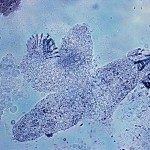Anopheles mosquitoes are the vectors of the human malaria parasite, Plasmodium, which causes more than half a million deaths each year. In nature, exposure to diverse microbes can prime the mosquito immune system and influence mosquito transmission of Plasmodium. We found that a vaccination-like treatment of mosquitoes with an insect fungus or its cell wall components elicits a cross-resistance against subsequent malaria parasite infection, called immune priming. We also identified a chemical fraction of this fungus cell wall that trigger the mosquito cross-resistance to the malaria parasite. We hypothesize that mosquito immune priming is mediated by alteration of chromatin structure leading to changes in transcriptional enhancer function and consequent regulation of immune gene expression. We have generated a genome-wide enhancer catalog for Anopheles, as well as methodologies for enhancer experimental manipulation. This project will characterize the mechanism of innate immune priming in Anopheles, by the following aims :
- Identify the fungal cell wall elicitors of immune priming using glycobiology techniques combined with mass spectrometry and NMR.
- Determine the gene expression profile induced by immune priming using RNA-seq, with functional validation of candidates using gene silencing and other genomics approaches.
- Detect changes in chromatin caused by immune priming using epigenetic techniques including ATAC-seq, Hi-C and ChIP assays.
- Investigate immune priming of mosquito larvae as a candidate translational tool to reduce malaria transmission by adult mosquitoes in nature, with testing of candidate compounds in the laboratory and potentially in an African semi-field cage system.
Experience in mosquito biological models is not necessary but would be a plus.
Keywords: vector biology, mosquito immune priming, malaria, functional genomic, epigenetic, fungal cell wall

